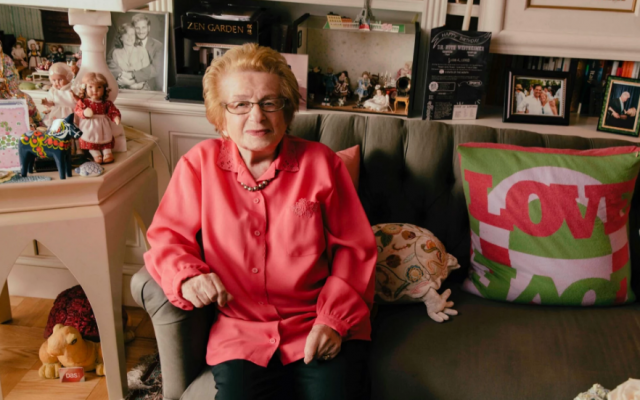‘Ask Dr. Ruth’ Doesn’t Ask Enough
“Ask Dr. Ruth,” the new documentary about the sex therapist Dr. Ruth Westheimer, will not disappoint her many fans.
“Ask Dr. Ruth,” the new documentary about the sex therapist Dr. Ruth Westheimer, will not disappoint her many fans. An AJFF Selects presentation of the Atlanta Jewish Film Festival last week, the film is an affectionate and slickly produced tribute to one who has long been affectionately called “Grandma Freud,” the sex therapist.
In her cluttered N.Y. apartment, Dr. Ruth has managed to hang on to many of the reminders of her long and successful life. Each is used in the film to tell some part of the story, which begins during Hitler’s rise to power in the 1930s in Germany.
She still has the washcloth that her mother gave her when she shipped out on one of the Kindertransports to Switzerland in 1938. Her initials were embroidered in small letters on one side.
Thousands of German Jewish children were separated from their parents before the war. Her life was saved, but there was nothing she could do to save her parents who died in the Nazi Holocaust in the 1940s.
She still has each of her mother’s letters that she wrote her daughter in the Swiss orphanage where she lived out the war. And she still has the diary that she kept during those years in Switzerland and even some photos from that time.
There are pictures of boyfriends and lovers, and of the three husbands she either divorced or outlived during her 91 years. Nothing seems to slow her down, not as a teen whom one friend remembers could not sit still for 10 seconds, nor as a woman in her ninth decade who still employs a full-time scheduler to remind her of where and when she needs to appear next.
Finally, there are the numerous recordings of her early career in N.Y. radio, where her cheerful, direct questioning and short, simple prescriptions for sexual happiness made her a sudden and unlikely candidate for stardom beginning in her early 50s.
The documentary makes frequent use of a “60 Minutes” profile done by Diane Sawyer in the 1980s and frequent clips from the nearly 500 syndicated television programs she created around the same time.
Her public appearances opened up the conversation about all sorts of sexual behavior that had rarely been discussed publicly with such frankness and good humor. No subject was off limits, except one, Ruth Westheimer’s own intimate thoughts about herself.
Then as now, this smart, aggressive survivor of the Holocaust years throws up a wall that the producers of this likeable documentary never make an attempt to breach. We never really learn what it is that makes her run, what propels her so late in life at such a frenetic pace.
Like the good therapist that she is, she is ready to explore the deepest recesses of her clients’ psyche in very public ways, but seems to disclose little from her own dark storehouse of memory, even to her own children.

When her daughter was asked to comment at last week’s AJFF screening about her mother’s attitude toward Judaism and Jewish life, she thought it a difficult question that seemed even more tough to answer.
More curious still, that in this film about a woman who lost her father in Auschwitz and her mother in the Nazi ghetto of Litzmannstadt (Lodz), she is never asked by the producers what that religious heritage means to her.
So “Ask Dr. Ruth,” which was in production for two years and benefits from an abundance of resources, a generous budget and Dr. Ruth’s eager cooperation, never rises much beyond a filmed version of a People magazine profile.
Perhaps that has as much to do with the marketplace as it does with the subject of this film. Maybe it’s part of the price that filmmakers pay these days, when documentaries have become not a staple of public television or a candidate for a Peabody award, but hot, commercial properties that have the potential to return millions at the box office and rival successful feature films.
When you are a programing executive at Amazon, Netflix and, in the case of “Ask Dr. Ruth,” an executive at Hulu who demands a hit, you don’t risk alienating the very valuable subject of your production or the audience that has invested so much of itself in the image of this driven and sweetly charming performer.




comments